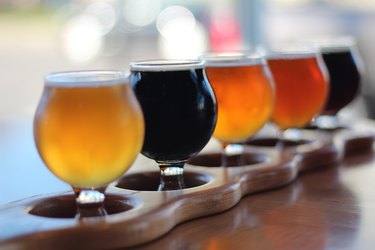
Most everyone has heartburn occasionally, and an array of food and drink may contribute to the cause. That includes beer, a heartburn risk because it's alcoholic, acidic and carbonated. Some beers also have added ingredients — chocolate, coffee, chili peppers or mint — linked with heartburn.
Read more: Bad Effects of Beer
Video of the Day
Video of the Day
Understanding Acid Reflux
Your stomach is connected to your mouth via a tube known as the esophagus. Where the esophagus joins the stomach is a tight ring of muscle called the lower esophageal sphincter, Mayo Clinic explains. It keeps the contents of your stomach contents from backing up into your esophagus.
When that sphincter relaxes, acidic stomach contents can flow up the esophagus, irritating the lining and causing a burning sensation. This acid reflux, commonly called heartburn, may develop into a more serious condition, known as gastroesophageal reflux disease (GERD) if it occurs regularly, several times a week, according to the National Institute of Diabetes and Digestive and Kidney Diseases (NIDDK).
"If you're having heartburn more than three times a week, it definitely needs to be addressed," says Ruth Mokeba, MD, who specializes in gastroenterology and hepatology at University of North Carolina REX Healthcare, in Raleigh.
GERD can lead to inflammation of the esophagus, a narrowing (stricture) of the esophagus, chronic cough or sore throat, a hoarse voice from laryngitis and more serious conditions such as pneumonia, asthma, Barrett's esophagus or cancer, according to the institute. Treatment may require dietary restrictions, medication or surgery.
Beer and Acid Reflux Link
Smoking, obesity, pregnancy and some medications have all been associated with the development of acid reflux and GERD, notes the NIDDK. But so have certain foods and drinks, including alcoholic beverages, adds NIDDK.
"Alcohol, in general, affects acid reflux by relaxing the muscle at the end of the esophagus," Dr. Mokeba says.
Opting for light beer might reduce your alcohol consumption, but not by much. A regular, 12-ounce beer is about 5 percent alcohol, says the National Institute on Alcohol Abuse and Alcoholism. By contrast, some light beers have an alcohol content of 4.2 percent, it says.
Also, just as overeating can cause acid reflux, Dr. Mokeba says, so can consumption of several beers. This can make the stomach too full, and bubbles of the carbon dioxide or added nitrogen in beer could compound the feeling of fullness. "Sometimes, if you have a large amount of anything — food and drink — it can relax the sphincter," Dr. Mokeba says.
Acidic foods and drinks may also lead to acid reflux in some people. Acidity is measured with the pH scale, with 7 being neutral, 8 to 14 being alkaline or basic and 0 to 6 being acidic. The lower the number, the more acidic a substance is.
Beer, with its ever-expanding numbers of styles, ranges broadly in acidity. Most lagers — think the big commercial brands of pale beers — are slightly acidic, ranging from 4.0 to 5.0 on the pH scale. Ales, which comprise the bulk of craft beer, cover more ground, from 3.0 to 6.0 pH, and sour styles are often quite acidic, as low as 3.3.
"Anything that is high in acid — fruit, drink — will cause reflux," Dr. Mokeba says. Citrus fruit, chocolate, coffee, hot spices and mint have been implicated as sparking bouts of heartburn for some people, says the NIDDK. Brewers add all of these, singly or in combinations, to some craft beers.
In addition, greasy and spicy foods are on the list of reflux instigators, so the beer you're drinking may not be the cause, or the only cause, if you're using it to wash down habanero chicken wings.
What the Experts Say
Research results are mixed on the roles of dietary influence on acid reflux and GERD. An August 2019 paper in the Journal of Thoracic Disease notes that some studies have shown an association between acid reflux and alcohol intake, but others have not. Similar conflicting findings have been made regarding carbonated beverages and acidic beverages. Still, dietary restrictions are typically part of GERD treatment.
Also, Dr. Mokeba says that what causes heartburn for one person may not do so for another. She advises patients to stop or reduce intake of suspect food and drinks to see if that improves their acid reflux, in addition to eating small meals and avoiding eating shortly before bedtime.
Read more: Beer and Diverticulitis: Not a Winning Combo
- National Institute of Diabetes and Digestive and Kidney Diseases: "Definition and Facts for GER and GERD"
- Ruth Mokeba, MD, specialist in gastroenterology and hepatology, University of North Carolina REX Healthcare, Raleigh
- National Institute of Diabetes and Digestive and Kidney Diseases: "Symptoms & Causes of GER & GERD"
- National Institute of Diabetes and Digestive and Kidney Diseases: "Eating, Diet and Nutrition for GER and GERD"
- Journal of Thoracic Disease: "The Role of Diet in the Development and Management of Gastroesophageal Reflux Disease: Why We Feel the Burn"
- Mayo Clinic: "Gastroesophageal Reflux Disease"
- National Institute on Alcohol Abuse and Alcoholism: "What Is a Standard Drink?"
Is this an emergency? If you are experiencing serious medical symptoms, please see the National Library of Medicine’s list of signs you need emergency medical attention or call 911.